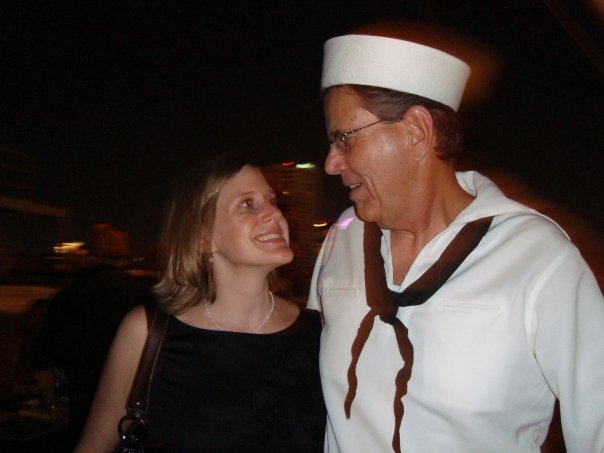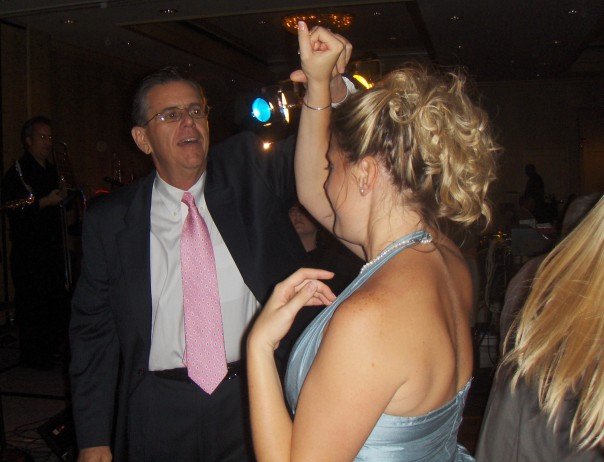My dad died unexpectedly 7 years ago—3 months before my wedding. Here are my raw, unedited thoughts about loving & losing someone with Borderline Personality Disorder (BPD)—a severe form of mental illness characterized by instability in emotions and relationships.
A thread
1/x
A thread
1/x
As a child, I didn’t have the language to give my father’s illness a name. Instead, I learned to grapple with and then radically accept all of the parts of him. These parts were seemingly at odds with each other, unpredictable, and always (for better or worse) very intense.
2/x
2/x
Examples: Singing jazz like Frank Sinatra AND screaming obscenities unprompted. Buying me a car AND refusing to pay my mother child support. Being jovial, personable, charismatic AND extremely aggressive/insulting. Calling me his “pumpkin-head” AND a “no-good-son-of-a-bitch”
3/x
3/x
I was the best, and then the worst, sometimes in the same sentence, and it made growing up and developing a self-concept a challenge. I tried to please him by doing/saying exactly what he wanted, but it was a losing game played by his rules & the rules were always changing.
4/x
4/x
My favorite strategy: Maybe I could get straight A’s, get along with everyone, and always smile? Maybe that would make me agreeable enough to keep him from yelling at me? Nope. Being perfect wasn’t perfect enough because nothing ever was.
5/x
5/x
It was a losing game bc his volatility & emotional instability were a product of his own deep-rooted trauma experiences that had never been recognized or treated. And his refusal to see a therapist (“I am not the problem!”) meant that these symptoms were going to be chronic.
6/x
6/x
To make matters worse, his mental illness co-occurred w/other mental illnesses like depression/anxiety and health issues like obesity and heart disease (as they often do). His trauma history weighed heavy on every part of his life, and subsequently, mine.
7/x
7/x
How it affected me: Internalized depression and anxiety covered up by a lot of giggles and smiles. Trying to please everyone—not just my dad. Inability to make decisions and develop preferences because what if they weren’t the right ones?
8/x
8/x
What helped: An incredibly stable, selfless, and strong mother. My brothers. A school and community environment that made me feel really safe and comfortable. A deep empathy for my dad and what happened to him as a child.
9/x
9/x
My dad died of congestive heart failure despite spending the last 12 years of his life at a normal weight. He was able to find balance w/his diet & physical activity and became a motivation for others. It was inspiring & undoubtedly lead to me become a health psychologist.
10/x
10/x
Coping with losing my dad so far: A 3-year process of intense sadness and grief, but mostly of losing the good parts. The jokes, his fascination w/people, his voice, his advocacy for me, & his love. Trying to celebrate the parts of me that are uniquely him (e.g., karaoke).
11/x
11/x
The last 4 years: Something new: Recognizing and naming the persistent emotional abuse & the impact it had on me then and now. Working through feelings of anger, reprogramming parts of me that were adaptive & protective as a child but no longer serve me as an adult.
12/x
12/x
Grief is the cruelest rollercoaster with no real distinct stages, but it is a unique and deeply personal experience that inevitably leads to growth—whether you are ready for the ride or not.
13/x
13/x
Dialectical Behavioral Therapy (DBT) is an evidence-based treatment for BPD, and focuses on emotion regulation, distress tolerance, mindfulness, and interpersonal effectiveness. Being “dialectical” means that two opposing forces can both be true at the same time.
14/x
14/x
My dad struggled with being dialectical but having him as a father made me an expert. He was funny AND offensive. He was a fierce advocate AND a harsh critic. He was loving AND abusive. He was the only dad I’d ever want AND I deserved better.
15/x
15/x
My message for the public: BPD is a real disorder that often stems from early childhood abuse and is not just people being “difficult” or “bipolar”. Let’s reduce stigma and focus on treating childhood trauma & increasing evidence-based treatment options for those with BPD.
16/x
16/x
My message for other children (or adult children) of parents with severe mental illness (SMI): 1) It was never your fault and there’s nothing you could have done to change it; 2) Emotional abuse is real abuse, and abuse is trauma that needs to be treated;
17/x
17/x
3) Don’t retraumatize yourself by falling into relationships (professional or personal) that are abusive and toxic. You might have felt like you needed to maintain a relationship with your parent, but you don’t have to maintain a relationship with those who trigger you.
18/x
18/x
And most importantly: 5) You might not know it yet but being a child of a parent with SMI is your greatest struggle AND your hidden superpower. Believe that and look inside to figure out how to harness the strengths the experience has given you.
19/x
19/x

 Read on Twitter
Read on Twitter









